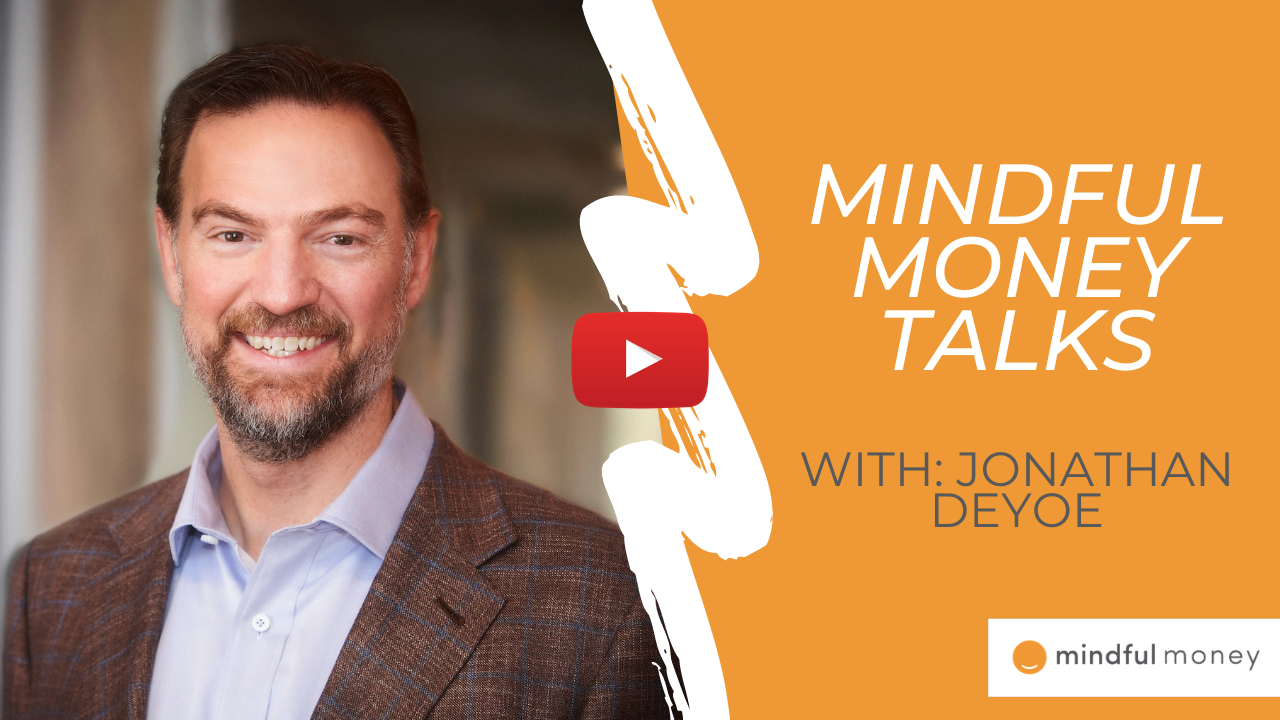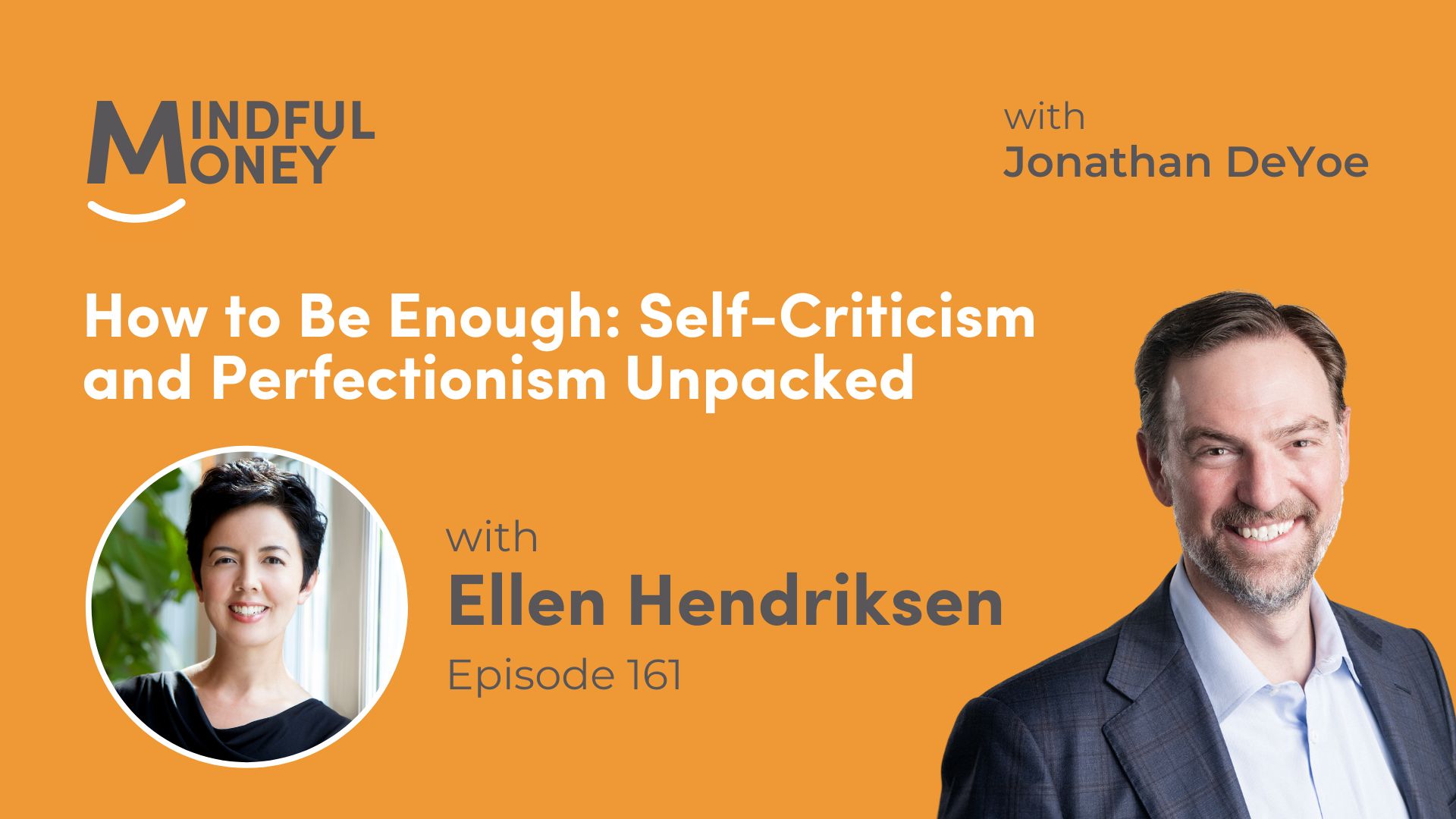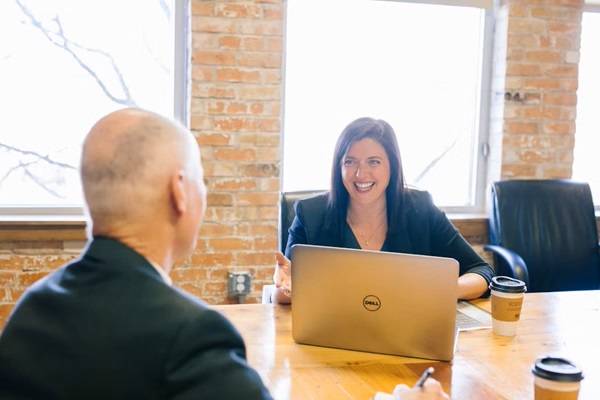Money is personal — everyone has a unique relationship to it. People often make irrational, and emotional money decisions by following trends and what the media tells them to do. In this interview, Jonathan talks about the importance of managing your money, and how he manages his clients’ money with mindfulness. Jonathan also discusses overcoming anxiety and his thoughts on how to plan for the future.
This is part six of the Mindful Money Talks series. Get to know the Mindful Money team while learning more about how to be mindful with your money.
FULL TRANSCRIPT
Andreina Villegas: Hello mindful money planners and happiness seekers. I am here with Jonathan DeYoe, the president and CEO of Mindful Money. Hi Jonathan!
Jonathan DeYoe: Hi Andreina. How are you?
Andreina Villegas: Good! I am doing well! We are so glad to have you. So Jonathan founded Mindful Money in 2001 with the intent of offering really exceptional customer service and then also giving independent financial advice. So we are here to learn a little bit about you, Jonathan, and about Mindful Money and your personal expertise, but before we do that, we are going to go into some icebreaker questions to get to know you.
Jonathan DeYoe: Sounds good!
Andreina Villegas: Are you ready?
Jonathan DeYoe: I’m ready!
Andreina Villegas: Great! So tell us a little bit about yourself.
Jonathan DeYoe: Most of the people who work with me know that I grew up in Rapid City, South Dakota, and my childhood is kind of marked with some financial insecurity. This made me want to study business and money and I started investing in middle school and started trading stocks when I was about nine years old, with the money I made from mowing lawns, and birthday money… those kinds of things. It was kind of a way for me to escape the feeling as I grew older that I didn’t have enough or I wouldn’t have enough. But then I went to college, and I got really bored with finance, switched to studying philosophy and comparative religion. I moved to California to study in a Lutheran seminary, so I became a seminarian. I switched to become an academic student of Buddhism. I dropped out of that academic program and with $45,000 in student loan debt, which is probably not the best decision, I started working at Dean Witter in San Francisco. I was there for about two years before I went to a different firm. That firm merged and I ended up working at seven different Wall Street firms in about six years, universally a bad experience, almost quit three or four times, and ultimately, I left.
I had a guy named Ernie Guzman, who was a great mentor, who said, “You know what, you can do it your way”, and he recommended that I start my own firm. I started my own thing in 2002 out of my basement with like, six clients. Today, we serve around 300 clients/300 families, and we’ve created some educational courses that have been taken by hundreds of people. I met my wife in the late 90s. We were married in 03? I hope I have that right. She’ll let me know if I don’t. My son was born in 04 my daughter was born in 07. That’s kind of the thumbnail sketch of my history.
Andreina Villegas: Wow, that’s quite a road. So if you could pick one animal as your spirit animal, which one would it be? And why?
Jonathan DeYoe: We talked about this a little briefly before we started the interview and, you know, tried to hone in on is this the animal you’d like to be? Or is this the animal that would be like the one that best represents you? And I think the animal I would like to be is a Jaguar or a cat of some kind, you know, something powerful and strong and sleek and beautiful. But I think the reality is, it’s an elephant. I think that they’re calm, you know, they’re wise but playful, they’re strong but gentle. I think that probably the elephant is my spirit animal.
Andreina Villegas: I love that. It’s a really interesting choice. And they also have a great memory so they remember everything.
Jonathan DeYoe: My team would tell you, my memory is not so good. But the other stuff is true, but memory, not so much.
Andreina Villegas: If you had a theme song for your life, which one would you choose? And why?
Jonathan DeYoe: One? Wow! Yeah, I mean, I love music. I sort of partake in many different genres. I’m thinking about songs that have been on repeat in my life over different periods of time. So, Lennon’s imagination. Indigo Girls, Galileo, I used to listen to that one just constantly all the time, Eminem, not afraid. Oh, you know what’s the best actually? This is it. It’s Bobby McFerrin. “Don’t worry, be happy.” It’s a very Buddhist message. You know, what is it? In every life, we have some trouble. But when you worry, you make it double. Don’t worry. That’s it. Yeah. I love that. I think that’s it. That’s my theme song. It’s amazing. And he does so many vocals and it’s all so good.
Andreina Villegas: Nice mix of genres, that’s really interesting. If you could describe yourself in three words, which would you use?
Jonathan DeYoe: I think the first one is probably optimistic. And the second one is focused. And I’d like the third one, it gets a little bit but I’d say it’s compassionate. I could probably go one or two different ways, but try optimistic, focused, and compassionate.
Andreina Villegas: Awesome. What’s one thing your coworkers don’t know about you?
Jonathan DeYoe: This is kind of a tough question. I’m a very anxious person. I’m always unintentionally envisioning bad things happening, you know, my kids getting injured, people leaving me, scary noises in the dark.
You know, keeping the anxiety at bay is a pretty near-constant battle for me. And my mom, she suffers from anxiety as well, she suggested that it’s genetic, and maybe, you know, it’s something that we can medicate. And I’m not, I don’t want to do that. So, for me, meditation is kind of my anxiety prevention or anxiety treatment. But it’s something I always have to deal with.
Andreina Villegas: I think meditation is one medicine, for anxiety or stress. What’s one thing that everybody seems to love that you don’t understand why?
Jonathan DeYoe: Hot new investment ideas, all of them. Like investing in my mind, investing is a simple process. It has to do with probabilities, it has to do with value, it has to do with earnings. And these things come out of nowhere and they become headlines and the media loves them and chases them. And I just wish it would not happen because it ends up hurting everybody. And it’s just… I don’t get it. I just don’t get how we get sucked into these things. Everyone that comes around gets sucked into it culturally, and it just doesn’t make sense that we keep doing it. But yeah, that’s it. I don’t get any of that.
Andreina Villegas: Yeah, there’s so much misinformation that it can be really, really daunting to know what’s actually true and what’s not what’s effective, what’s not.
Jonathan DeYoe: Right. Well, I mean, I don’t think the information is out there to tell you what is smart. But then there’s this overwhelming emotion that comes with many headlines and lots of people that you trust talking about it. And then suddenly, it’s a thing that’s front and center, and have to actually address it. Unless you have a rule that says, All this is stupid, and you just have to ignore it. That happens as well.
Wisdom and Experience
Andreina Villegas: So well, now we’re just gonna move into the area, getting to know more about your wisdom and your experience. So my first question is, what’s one thing you wish you would have known when you began your career?
Jonathan DeYoe: Oh, god, this is easy. So I joined Dean Witter, and I went to Morgan Stanley, and then I went to Paine Webber. I spent the first many years of my career at big Wall Street firms. Now, what I didn’t know… I mean, I came out of a graduate program in religious studies. So I didn’t really understand the business side of the financial services world. I really wish I would have known about IRAs and small planning firms and would have skipped the whole brokerage selling environment. I think that I’d be so much further ahead and be helping a lot more people today, had I not spent the first six years shelling, schilling stock, and selling stuff that didn’t have value to it, it was just not good for anybody, not good for the clients… great for the firm, not good for the clients, not good for me. I wish I would have understood the differences in the different roles that advisors could play versus brokers.
Andreina Villegas: Great, and what advice would you give to someone wanting to pursue a career similar to yours?
Jonathan DeYoe: I guess kind of in the same vein, realizing as soon as possible that you have a choice. There are people that focus on managing investments and there are people that focus on managing investors or supporting investors and in good investor behavior. What we do is focus on managing investor behavior. So if you want to do what we do, if that’s kind of a goal, then before college, if you’re thinking about this pre-college, then you want to study things like humanities, financial history, philosophy, psychology. These are the things history in general, you want to study these things. Whether you’re a pre or post college and if you’re interested in this industry, I would say read everything Nick Murray has ever written and just start reading everything you can about behavioral finance and behavioral economics. I think that it is our role to apply the lessons of behavioral finance and behavioral finance.
MX with our clients. So that’s probably the best thing you can start with.
Andreina Villegas: And what’s the common myth about your profession that you would want to debunk?
Jonathan DeYoe: A common myth. It’s not just our profession, but it’s pervasive across all finance. It’s this, it’s that advisors or anyone can pick winning investments in advance. It can’t be done. It’s something that clients come thinking and that’s what they want. It’s something that the media talks about all the time. But the media is always talking about what happened, “Hey, look at this great investment that already happened.” It was a great investment, it doesn’t say, “Hey, it will be a great investment.” And that sort of makes people think, you know, well, we can predict, and we can’t predict, and we need to debunk the myth that we can predict.
Andreina Villegas: Excellent, and what’s the thing you like the most about your work?
Jonathan DeYoe: I like that we can help people put money in the context of their lives, in our culture, you know, the definition of success can get pretty twisted, the tendrils of money reach into all areas of life. But that doesn’t mean money has to be the focus or even should be the focus. So when we do this, we put money at the center. And that causes enormous amounts of stress, and it hurts health and hurts relationships. It doesn’t bring better outcomes either. So we have this process called our mindful wealth mapping process. That helps people put their financial lives together kind of like a puzzle. And so the thing I think I like the most is watching a client’s face when that final piece of the puzzle fits. And they see, “Oh, you know, it works, I can have this retirement income for the rest of my life, I can leave this legacy for my kids, I can support my kids in college.” When that last piece fits, I think that’s a really kind of a special moment when they see the plan, and they see that they can make it happen.
Andreina Villegas: Wow, that sounds super powerful. That’s great. And if you could tell me a story that touched your heart related to your profession, and how that changed your career.
Jonathan DeYoe: Which one would it be? There are many, many, many, many clients stories I could share. I think that I think the most interesting thing that actually changed my work was about 10 years ago, I was at a conference and I saw Mark, who is the former CEO of one of our not our custodian, but one of the biggest custodians, Pershing, owned Bank of New York. But he told a story about an advisor who died without a succession plan in place. Now, Mark was talking to an audience of advisors. He made sort of the obligatory comments about how this left that advisor’s family in the lurch. But the more important message, I think Mark was suggesting, was that by not having a succession plan in place, that advisor really hurt his clients. Because it’s basically failing as an advisor. Think about this: the advisor dies, clients, some of which were in their 80s, suddenly find themselves in a position of uncertainty and fear. They don’t have the advice they’ve always had, they don’t have the guidance that they’ve always had. They don’t have the behavioral advice they’ve always had. And just some simple planning would have made that better. So that’s kind of the story.
True client care requires a sustainable enterprise. And so in our business, the way that comes through into what way that changed things for my work, is I started looking for a couple of years, I looked at partnering with a larger organization, so something that would make us sustainable. But ultimately, we decided with the team on this that we just build something that’s internally sustainable. Rather than seek a big partner, let’s build something that’s internally sustainable. And that’s why there’s been in the last 2, 3, 4 years, there’s been a big resurgence. We’ve hired a bunch of people, we have grown more, we’ve added new clients, not that I don’t want to grow for growth’s sake. So we’re still very selective of the people we’re bringing on as clients and the people we’re bringing on to work with us. But I do want to see Mindful Money continue after me. And so for that to happen, we have to have enough people, maybe it’s 15, maybe it’s 20 people, we have to have enough of a consistent revenue stream, we have to have something that lasts.
I’m imagining myself someday as just a client of the firm, Mindful Money, not the CEO, not the President, not the founder. Just a guy who works with other advisors, you know, has an advisor at Mindful Money. I think we can get there just a matter of time and concerted effort.
Andreina Villegas: Wow, yeah, I think you can definitely get there. And if you could give a piece of advice to someone who’s studying to plan their finances, what advice would you give them?
Jonathan DeYoe: We have a phrase somewhere on our website that says “stop predicting, start planning, stay mindful.” This really isn’t rocket science. There’s very little in the way of specialized knowledge in the industry, but the world focuses so heavily on markets and performance. If you just turn on the news or read a newspaper, or check your news feeds or whatever, there are people that are constantly pushing us with fear and greed to make financial choices. We end up responding by making those financial choices, some of them not so good.
So this is the culture of prediction. But there are tons and tons and tons of studies that look at the quality of our predictions. Turns out, we suck at it, we are not good at making predictions. So really, you got to stop predicting. And if you’re not predicting, what do you do? Well, let’s use problem, probability, and models, and plan.
Once you have the plan, you have to stay forever mindful of the difference between, okay, there’s this news story, I’m getting pulled into the mode of prediction, versus there’s this news story. There’s a thing out there that makes me feel afraid or excited. How does that affect my plan? So it’s going back to the plan. Stop predicting, start planning, and then stay mindful of that difference.
Andreina Villegas: Okay, so as you know, this has been a bit of a complicated year, and there’s more to come. What roadblock do you see coming in 2021.
Jonathan DeYoe: We always as humans tend to always say that the thing that we’ve just recently gone through is the most complicated or the worst. Here’s the US election cycle which is definitely crazy. But, if we think back to Vietnam, and we think back to some other times, there’s some there’s some equally crazy election cycles. So the point of that is that it is crazy, but it’s always crazy. The illusion that it’s someday it is not going to be crazy. That’s kind of silly.
But there are some distinct areas of roadblocks. You can think of GameStop, Bitcoin, IPOs, this new, not new, but new public knowledge thing called SPAC investing. More importantly, there are people behind those things that are pulling levers that are making enormous amounts of money. And they may not be technically manipulating markets, but they are certainly playing on people’s fear and greed impulse. Just being aware of that, that’s a roadblock in itself. And finally, I think that I think the biggest issue that we’re facing, isn’t the election cycle, isn’t COVID, but that there is a huge secular change afoot. Rates, I think, hit rock bottom in November, December, and we’re getting a little technical here, but since then, they’ve snapped back impressively. And this is, or could potentially be, the beginning of a long uptrend and rates. If it is, which we won’t know until hindsight, then the investment universe is about to change drastically, all those things that are growth oriented, those things that used to work, will not work as well. It’s really interesting and something to be aware of, again, we’re not going to know for a number of years looking back if that’s the case, but there’s going to be some surprises.
Andreina Villegas: How do you think discipline behaviors can have a long term effect on a person’s life?
Jonathan DeYoe: Most of our behavior, most of our reactions, are habitual. Our amygdala pretty much determines our lives. It tells us, our amygdala, makes us move, makes us act in every way: relationships, work, money, recreation. Our response to every stimulus is pretty much driven by our amygdala. And these cognitive processes and these habits, we don’t really understand them. So the discipline that we can have can actually be helpful in changing some of those habits. So practicing discipline behaviors can affect the habits. And if we have better habits, we get better outcomes. Make sense?
Working with Mindful Money
Andreina Villegas: Yeah, totally. I think having habits and a routine is definitely a way to kind of improve your life and make things work better for you. We’re going to talk about mindful money in the next segment. So let’s move into that mindful money segment. How did you make the decision to found Mindful Money and why?
Jonathan DeYoe: It wasn’t founded as Mindful Money. 20 years ago, when I started the firm, it was founded as actually a firm doing wealth strategies. Because at that time, I still was coming out of Wall Street, I still thought that I could predict, I still thought I could have a strategy that would work. Then I shifted to do wealth management, but I made the original decision to start to deal with strategies because I couldn’t align the demands of my employer with the needs of my client, and I tried at six or seven different firms, I couldn’t make it work. So I left because I knew that the thing that was most important wasn’t the latest hot product, it wasn’t this stock or that stock that the company was selling or wanting me to sell. It was education and planning.
The original impetus was how do I create a client-focused firm that actually works with the levers that we know work for long-term better client outcomes? That was the reason to do it. And the name Mindful Money didn’t come around until after 2012. It’s very recent, like a couple years ago In 2017, when I published my book, and that kind of brought together this idea of, well, the two streams of my life came together… the financial services stream, and the money and mindfulness. The mindfulness stream came together in the book. A couple of years after that, I said, you know, this is the vision, and this is what we are, let’s just rename the firm to this. And so everyone that works with us now has worked through that name change, which is fantastic, everyone’s supportive. I was always worried about it. A lot of people are gonna think I’m soft and think I’m silly to name it Mindful Money. But so far, everyone has responded great. I feel great about it now.
Andreina Villegas: I love the name and the whole brand! I think it is amazing.
Jonathan DeYoe: Thank you.
Andreina Villegas: Could you tell us a little bit more about your role at mindful money? What you do and everything?
Jonathan DeYoe: Yeah. I think John would tell you that I’m the guy with the vision, you know, how all the different parts and how the messaging all fits together. John and Gail, take care of almost all the operational aspects of the firm. Advisors and planners work most with the clients. I kind of set a tone, I build portfolios, I work with more complex financial situations, and I basically create the messaging. I’m where the buck stops, if there’s an issue or a problem, or, a big decision that has to be made, and no one else wants to make it, I get to make it. That’s it, but the team does most of the work. And, and I love writing, I love speaking and I love doing this kind of thing. That’s where I spend most of my time.
Andreina Villegas: What does being mindful of your money and finance mean to you?
Jonathan DeYoe: So Mindful Money starts with this admission: we are not as rational as we think. Right? Mindfulness is a way to see the world how it is, and then note our reactions to it. I think most of our financial problems stem from a lack of understanding about how markets work, and therefore a belief that it can be predicted or controlled, or they come from not knowing what we really want to accomplish in life. Being mindful with your money is just noting those two things.
Andreina Villegas: Right. What advice would you give to someone who wants to be more mindful with their finances?
Jonathan DeYoe: This could be probably an hour conversation in and of itself. But just keeping it simple. You start with a plan, get an honest understanding of where you are, financially, and where you want to go. What are all those milestones along the path? Write it down, map it out. Then ask yourself, what levers you can actually pull to make it all happen?
I’m a meditator. I’ve been a daily meditator for a couple of decades. And I believe that our plan is to our financial lives exactly what our breath is to our meditation. It’s the thing we turn to, our focal point, when we’re distracted by other things, you know, when I’m sitting, my knee hurts, I go, “Oh, my knee hurts,” right? Is that pain going to be bad or, does it distract me from my breath. When I’m just going about my life, and I see a shiny new object that I’d like to buy, but it’s not something that’s really going to add value long term to my life. The tendency is just as viable. It has long-term repercussions because that money is no longer in my pocket, it’s no longer invested, it can’t be used to pay for my kids’ college education, and it can’t be used for my retirement.
So by returning to my plan as my focal point, I can make better decisions. And I think that’s really what it means to be more mindful about your finances. What do I want? What do I want for my life? What decisions can I make with the dollars that I have to help me get those things that I really want? And lining it up.
Andreina Villegas: That’s very powerful. Thank you for sharing. And what’s the biggest challenge you have to deal with in your current role? And what are you doing to overcome it?
Jonathan DeYoe: Right now just talking about the role this is, I think the challenge is finding the right people from diverse backgrounds to join the team. I have to admit that our team right now doesn’t fully reflect the diversity of our community. And so my hope is that as we add people to the team, we come to reflect the diversity of our community more. We’ve been thinking through it, you know, how are we going to solve it? We’ve been reaching out through networks. We have job postings, and those kinds of things out there. And we’re starting to see some things come in that are interesting. Some people reach out to us. And if you stay tuned on this one, in six months, 12 months, you’ll see a couple new people. I’m hoping that’s the case. But that’s the biggest challenge, is finding people that really fit that also add to the diversity of our team.
Andreina Villegas: Excellent. And how do you continue to learn in order to stay on top of things within your job?
Jonathan DeYoe: Oh, god, this is easy. I read every single day, and I have two different news feeds that come in, news readers, and they populate with one of them, how to have a better life, managing your own habits, mindfulness, relationships, meaningful work, that kind of messaging. The other one populates itself with market economics, what’s the Fed saying? What are all the different feeds talking about? And all that market data that comes in. So I have these two feeds I read thoroughly every single day and I do that because I love it. And I happen to have a job that actually has both parts come together.
Andreina Villegas: Great. And what are you curious about now? And why?
Jonathan DeYoe: This one hurts a little bit, because I’m actually most curious about how we’re going to come together. It all feels fractured right now. There’s right versus left, haves versus have-nots, men versus women, black versus white. I’m mostly curious about the path to reconciliation. And getting to a place where, when I grew up, I do it in a Lutheran Church. And this concept of being our brother’s keeper, or sister’s keeper was important in my family, and my dad and mom lived by this. They were very supportive of anyone and everyone that needed it, even though we didn’t have enough ourselves. And I think that we need to get there. Regardless of our differences. I think we need to tolerate and love each other, regardless of how we’re different. And I’m curious about how we get there. I don’t see a distinct path than that, you know, that’s painful to watch, actually. Yeah, I can’t wait until we get to that point. It’s going to be exciting. Imagine.
Andreina Villegas: Yeah, definitely. And in your own words, what does this phrase mean? “Mindfulness is a doorway to more rational choices.”
Jonathan DeYoe: This is another you got this right off the website? It’s funny. We wrote this down. We had this big conversation. David Glotzer and I – actually the whole team was there- but David Glotzer was like “Jonathan, I don’t get it. What does mindfulness have to do with finance?” I kept coming back to what mindfulness is and it is a non judgmental acceptance of the world the way it is. What that means is seeing the world, and the market, seeing the economy, seeing my decision process for what it is, before I overlay a whole bunch of narratives and my amygdala reaches into all of my cognitive and emotional biases to make me make a decision. So what is really going on? Mindfulness lets me see what is going on. And it lets me make more rational choices. That’s the concept of mindfulness. It is one where you get to see both the world and your decisions about the world in a way that frames the decision and you can actually see better choices, to decide not based on emotion, but based on what do I really want? How does it really work? Let’s make the decisions to get there. In that way, mindfulness is a doorway to making rational choices.
Andreina Villegas: Amazing. Thank you so much. And with that, we finish our round of questions. Thank you, Jonathan, so much for taking your time to join us and sharing your expertise.
Jonathan DeYoe: Thanks, Andreina, for having me.
Andreina Villegas: Happy to. So we hope you enjoyed this my money talk series. And remember to start predicting, start planning, and stay mindful. Goodbye.






